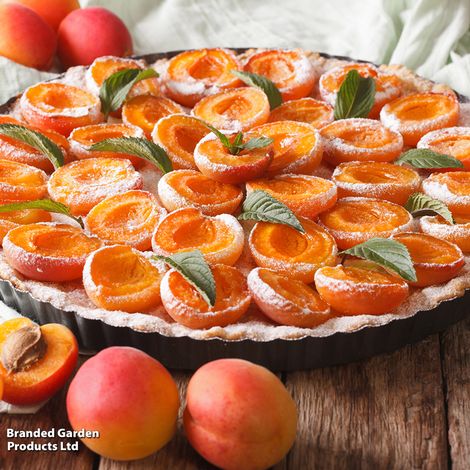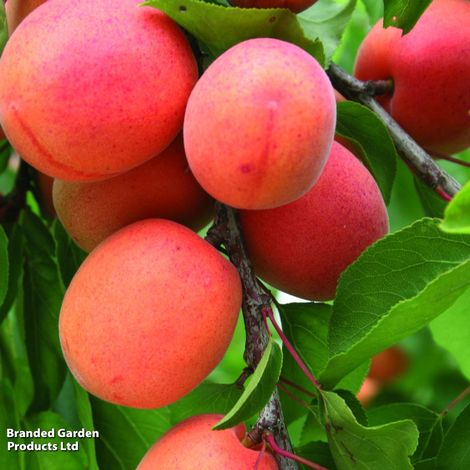Popular 11 others are looking at this right now


Apricot 'Tomcot'Prunus armeniaca
Hardy
£34.99
Red blushed fruits in late July
Attractive spring blossom
Self fertile
You May Also Like
This modern Apricot is more reliable than others, and better suited to the UK climate than many traditional varieties. The spring blossom is produced in abundance, followed by large, sweet and juicy, orange fruits with a fabulous red blush. Crops of Apricot 'Tomcot' ripen towards the end of July. This self fertile variety is makes a stunning feature, particularly when trained against a sunny, south facing wall.
- Peach, Nectarine, and Apricot rootstocks:
- Mont Clare - Semi dwarf reaching a mature height of up to 3m (10')
- Torrinel - Semi dwarf reaching a mature height of 3m (10')
- Krymsk 86 - Semi vigorous reaching a mature height of up to 4m (13')
- St. Julien - Semi vigorous reaching a mature height of up to 4.5m (14')
This variety is self-fertile and does not require a pollination partner.
Estimated time to cropping once planted: 2 years.
Estimated time to best yields: 4 years.
Useful links:
How to grow fruit trees Fruit rootstock guide
Plant height and spread is seasonal therefore we list by pot size rather than a defined plant size. The height and spread of the plant delivered will vary depending on the season, meaning arrival images are an indication only.
Show Codes
1 Bare Root Tree (St. Julien Rootstock) (KC0183)
These plants are lifted from the nursery field when dormant, and sent to you in late autumn or spring for planting. They often look dead on arrival, but they are just resting in the dormant period and will establish quickly for a strong start in the garden come spring. Set out in prepared soil in holes wide enough and deep enough to lay out the roots. Tread down the planting soil to knock out air pockets. Water well to settle. Apply a mulch to protect roots from cold temperatures. If conditions prevent immediate planting, set roughly into loose soil or a pot of compost (‘heeling in’) to protect the roots. Set these at the same level as they were in the nursery field – you should see a soil line at the base of the stem. Stake trees, taller shrubs and roses to prevent root disturbance.
Fruit trees do not suffer weed competition well. Keep weeds and grass clear from within a 30cm radius of base of the tree. In spring, while the ground is moist, apply a mulch of well rotted manure or garden compost around the base of the tree, taking care not to mound it up against the stem. This will help to retain moisture throughout the summer. Feed and water regularly during particularly dry periods.
Apricots, nectarines and peaches may be fan trained against a wall or grown as a bush. When pruning it is important to avoid winter pruning as this leaves them prone to silver leaf disease.
To bush train: In the first spring after planting, select 3 or 4 well spaced branches on a clear trunk of at least 75cm (29"), and shorten them by two thirds. Remove the central stem to just above the highest of the selected branches. Remove any laterals below the selected branches. In the following spring, select 3 or 4 sub laterals on each branch and shorten these by half to create a balanced, open framework. In future years these trees will require only occasional pruning to remove damaged, badly placed or diseased wood. This should be carried out during April. Heavy crops should be thinned when they reach walnut size to reduce stress upon the branches
Seeds and garden supplies will normally be delivered within the time period stated against each product as detailed above. Plants, bulbs, corms, tubers, shrubs, trees, potatoes, etc. are delivered at the appropriate time for planting or potting on. Delivery times will be stated on the product page above, or in your order acknowledgement page and email.
Orders for packets of seed incur a delivery charge of £2.99.
Orders which include any other products will incur a delivery charge of £6.99.
Where an order includes both packets of seeds and other products, a maximum delivery charge of £7.99 will apply - regardless of the number of items ordered.
Large items may incur a higher delivery charge - this will be displayed in your shopping basket.
Please see our Delivery page for further details, and more information on different charges that may apply to certain destinations.
For more information on how we send your plants please visit our Helpful Guide on plant sizes.





















